
 |
|
|
|
|
#1 |
|
Member
Join Date: Dec 2004
Location: Italia
Posts: 1,243
|
Hello.
This is one is my last purchase. Probably is a kuba nshaal knife. The blade is painted for half in white and for the other half in red. All comments are well accepted. Thank you 
|
|
|

|
|
|
#2 |
|
Member
Join Date: Dec 2004
Location: Houston, TX, USA
Posts: 1,254
|
Is the handle woven over with leather, or is it carved that way? What is the use of this item? Is it a ceremonial/costume dagger, as I'm given to understand of ikula? Kind of a mini ilwoon?
|
|
|

|
|
|
#3 |
|
Member
Join Date: Dec 2004
Location: What is still UK
Posts: 5,806
|
Hello, very interesting,what shape is the cross section of the blade?How thick is it?Can you provide a close up where the blade fits the handle?Looks great.Tim
|
|
|

|
|
|
#4 |
|
Member
Join Date: Dec 2004
Location: Italia
Posts: 1,243
|
Hi guys!
Hello Tom, the handle is covered with copper strips with perpendicular cuts. Honestly I don't know the use of this knife but maybe is a ceremonial or dance knife for women. I don't think that in any case is correlated with Ilwoon. Hi Tim, the cross section at the very tip of the blade is flat 3 mm, while where the blade fits the handle there is a middle rib thick nearly 1cm. This picture comes from AFRIKANISCHE WAFFEN of two kuba nshaal, but the blade is quite different. |
|
|

|
|
|
#5 |
|
Member
Join Date: Dec 2004
Location: Houston, TX, USA
Posts: 1,254
|
Interesting. Both the flared tip and the midrib at the base are similar to ilwoon. Ilwoon is a fighting sword, and I suspect this is a ceremonial knife, but it seems to me that some reference is being made. It is tempting to say the whole thing looks like a woman in a dress, but remember A/Central African men wear skirts, as much as women, and B/ in Central Africa swords are usually spoken of the other way around; the handle is hte feet or legs; the tip is the head, and some are even explicitly shaped with divided legs.
|
|
|

|
|
|
#6 |
|
Member
Join Date: Dec 2004
Location: Italia
Posts: 1,243
|
Hello to both you guys! Maybe you can help me: I have this ilwoon but i'm not sure of the age (before 1940?). The shape of the blade and that of the handle they leave me a little doubtful. What do you think about this?
|
|
|

|
|
|
#7 |
|
Member
Join Date: Dec 2004
Location: What is still UK
Posts: 5,806
|
I so admire Congo iron work,such fluid forms,the beauty of the easy looking hammer marks reminding one of the red hot softness, all giving the impression that the piece was forged in one heating.Tim
|
|
|

|
|
|
#8 |
|
Member
Join Date: Dec 2004
Location: What is still UK
Posts: 5,806
|
Hello Flavio, I would think the best one can say is early 1900s.In some areas of collecting most people would poo poo this sort of age but with a lot of pieces from the Congo I consider this to be a good age.A great many people have no idea how isolated and how impassable the country was up untill the mid 20 century and rapidly becoming so again, rather like the lost tribes of the Amazon jungle of more recent times.I include a post of one of my Congo swords
Last edited by Tim Simmons; 27th March 2005 at 07:01 PM. |
|
|

|
|
|
#9 |
|
Member
Join Date: Dec 2004
Location: Sint-Amandsberg (near Ghent, Belgium)
Posts: 830
|
Nice Kuba sword, Flavio. I think Tim is right concerning the age.
A lot of African weapons were still being produced in the middle of the 20th century. Remember that people used to bring axes and knives back from 'the Congo' when they visited their homeland. This is the case in Belgium. Most of the African weapons in my collection date from that time. They 'linger' in the attics until someone discovers them. When looking at your 'ilwoon', I notice some rust. I would advise you to remove the rust gently. I always use a copper brush fixed to my drill. In this way, the rust is easily removed. Afterwards, I put some oil onto the blade. I usually apply oil used for tools. You'll see, your sword will get its black patina again. Here's an example : The first picture shows a Mbanja throwing knife as I bought it. The second one shows the same knife after cleaning  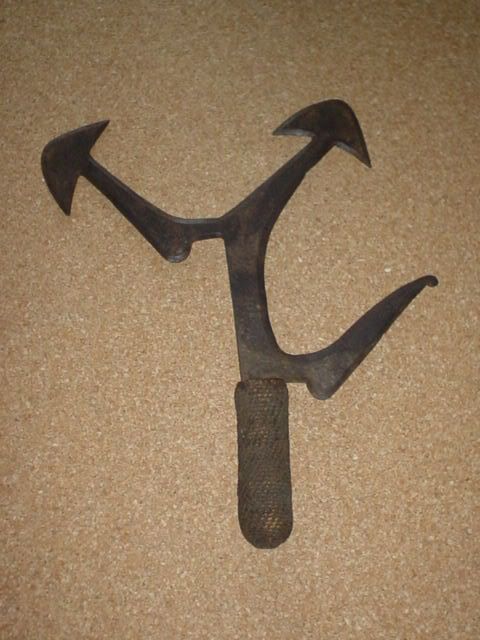 Freddy 
|
|
|

|
|
|
#10 |
|
Member
Join Date: Dec 2004
Location: Italia
Posts: 1,243
|
Thank you very much guys. Hello Freddy, i think that we know each other on ebay some times ago. The pictures of the ilwoon is before that i clean it. Now the rust is eliminated: I clean up the blades with iron wool and oil.
Hi Tim I have a Yaka sword like yours. |
|
|

|
|
|
#11 |
|
Member
Join Date: Dec 2004
Location: What is still UK
Posts: 5,806
|
Wonderfull, this is my favourite Knife.To me it sums up all of that 1960s intelligentsia raved about in African art.Tim
|
|
|

|
|
|
#12 |
|
Member
Join Date: Dec 2004
Location: Italia
Posts: 1,243
|
Great knife, Tim. This is my favourite, a Fang Fa knife from Gabon.

|
|
|

|
|
|
#13 |
|
Member
Join Date: Dec 2004
Location: What is still UK
Posts: 5,806
|
I imagine this just shows the extent of Arab influence as illustrated in that wonderful book De fer et de fierite'.Tim
|
|
|

|
|
|
#14 |
|
Member
Join Date: Feb 2005
Location: Clearwater, Florida
Posts: 371
|
Tim, sorry to bother you, but again, is the pommel end on the Ngandu sword iron or wood?
After viewing it repeatedly, I almost wonder if the dowel-like end on mine isn't made to insert into another, more decorative pommel to be complete? Mike |
|
|

|
|
|
#15 |
|
Member
Join Date: Dec 2004
Location: What is still UK
Posts: 5,806
|
Hi Mike, talking and looking at Congo Knives is not bother it is a delight.I hope these pictures explain themselves.I try to keep the typing to a minimum because I can only one and a half finger type, which is an improvment on just one.Tim
|
|
|

|
|
|
#16 |
|
Member
Join Date: Dec 2004
Location: What is still UK
Posts: 5,806
|
Hi I forgot to mention I have a spear with the same sort of markings as on your knifes blade.I shall show that as a new thread in the week.Sharpen your spears and hold fast!!!Tim
|
|
|

|
|
|
#17 |
|
Member
Join Date: Dec 2004
Location: What is still UK
Posts: 5,806
|
This thread keeps evolving.Nuba of the southern Sudan.
|
|
|

|
|
|
#18 |
|
Member
Join Date: Dec 2004
Location: Sint-Amandsberg (near Ghent, Belgium)
Posts: 830
|
Mike, there's nothing wrong with your knife. Perhaps, the top end of the handle was once covered with copper or brass. But I have seen similar knives without copper, too.
Talking about handles, here's a nice one. It comes from the Songye-tribe in Congo. Someone once told me these particular knives were used in ceremonies surrounding circumcission.  It's a big knife to use for that purpose It's a big knife to use for that purpose  The handle is made from wood and depicts the torso and head of a typical Songye statue. The blade has some nice engravings on both sides. I have seen similar knives before and almost all have only a Songye head as handle. This one is a bit different. The blade measures 18 cm. Total length is 33 cm. And...it's quite sharp ! 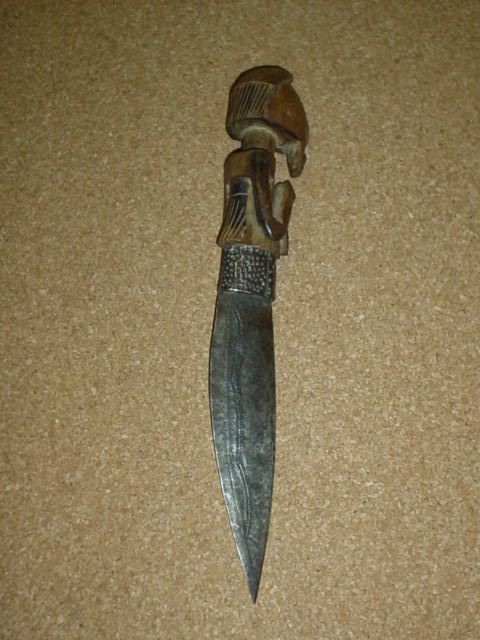 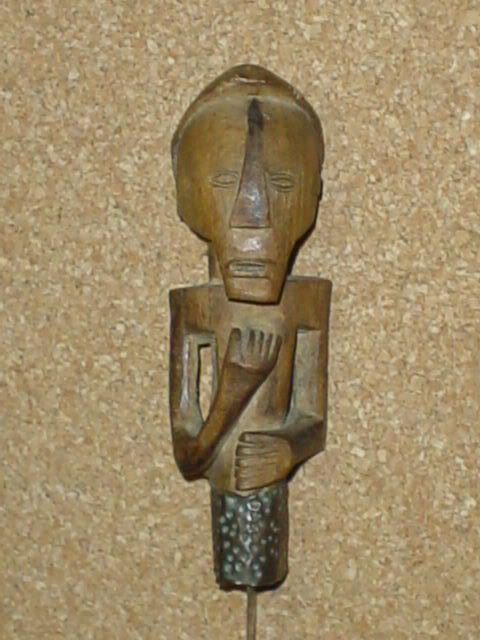 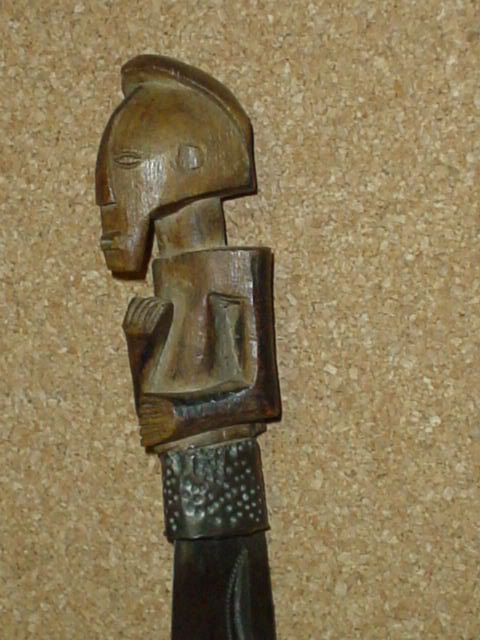 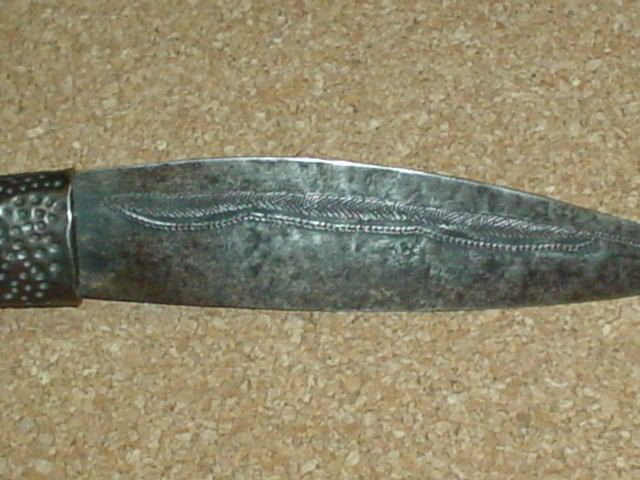
|
|
|

|
|
|
#19 |
|
Member
Join Date: Dec 2004
Location: What is still UK
Posts: 5,806
|
Freddy, you have some nice things.This little knife is for a similarly unpleasant task but not on the boys.I do not think it is that old and from eastern Africa.It is strange, one side has a surface of large pits,was this by accident or not?Tim
Last edited by Tim Simmons; 4th April 2005 at 07:57 AM. |
|
|

|
|
|
#20 |
|
Member
Join Date: Dec 2004
Location: Houston, TX, USA
Posts: 1,254
|
The pits are incidental, I dare say, and were possibly on a piece of metal that was recycled to make this knife. I have seen a few of these and none of the others were so pitted. I have no information on these knives, apart from that provided by the knives themselves; do you know what tribe(s) they are from? Do you have a source for them being scarification blades? I've speculated in this direction, but that's all it's been, and I had thought perhaps, like the bracelet knives, they are used for work; they seem to be intended to be carried as finger-rings (I doubt they are held thus for use), and I would guess they have a rawhide sheath within their native setting, though I have not seen such.
|
|
|

|
|
|
#21 |
|
Member
Join Date: Dec 2004
Location: What is still UK
Posts: 5,806
|
Hello Tom ,I do not know a specific tribe origin.Things like these come from a vast region.The southern Sudan to south Uganda.These are lumped in with other Knives as wrist and finger knives.I have tried all ways of using this knife held or attached to my fingers,it does not work.Held as illustrated, a great amount of control can be obtained by wrist movement,enough for quick delicate cuts in one action.The truth be told they are most probably quite general purpuse and the unpleasant job is done with anything sharp.Tim
|
|
|

|
 |
|
|